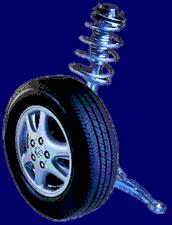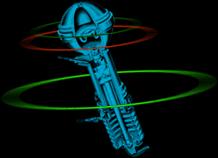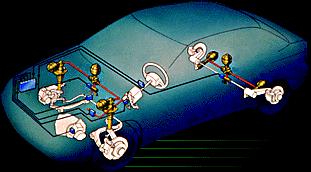Collision Avoidance: Active Suspension Control
 The ride, handling and maneuverability of a ground vehicle are greatly dependent on the suspension system of the vehicle. The induced vibrations from the road pass through the suspension system before affecting the body. It is again through the suspension system that the vibration of the body influences tires' dynamic loading and consequently handling of the car. Therefore a careful selection of suspension characteristics is important in isolating the unwanted vibrations and improving ride comfort while maintaining a desired level of road holding. The limited suspension working space is a third factor that needs to be taken into account in this compromise.
The ride, handling and maneuverability of a ground vehicle are greatly dependent on the suspension system of the vehicle. The induced vibrations from the road pass through the suspension system before affecting the body. It is again through the suspension system that the vibration of the body influences tires' dynamic loading and consequently handling of the car. Therefore a careful selection of suspension characteristics is important in isolating the unwanted vibrations and improving ride comfort while maintaining a desired level of road holding. The limited suspension working space is a third factor that needs to be taken into account in this compromise.
 One of the main challenges in the design of suspension systems is then to determine the optimum parameters to satisfy the generally conflicting ride, handling and working space requirements. However with conventional passive suspensions where the suspension parameters are fixed once they are designed, the versatility is not always enough. In passenger vehicles handling is sacrificed for more comfort and in sport cars with stiff suspensions ride is compromised.
One of the main challenges in the design of suspension systems is then to determine the optimum parameters to satisfy the generally conflicting ride, handling and working space requirements. However with conventional passive suspensions where the suspension parameters are fixed once they are designed, the versatility is not always enough. In passenger vehicles handling is sacrificed for more comfort and in sport cars with stiff suspensions ride is compromised.
Active suspensions on the other hand are adaptive systems with modulating properties that can provide a much superior performance in the trade-off between ride and handling. Based on the sensor readings and a designed control algorithm, the actuator(s) in an active suspension can supply energy into the system or modulate the rate of energy dissipation from the system and therefore offer more room for improving the performance of the suspensions.
 While such systems have been implemented in some high performance vehicles and Formula-1 racecars, their commercialization has been hindered by factors like cost and high energy consumption. However due to its many promising features proven in both research and application, active suspension remains among one of the main potential features of the modern passenger car of the near future.
While such systems have been implemented in some high performance vehicles and Formula-1 racecars, their commercialization has been hindered by factors like cost and high energy consumption. However due to its many promising features proven in both research and application, active suspension remains among one of the main potential features of the modern passenger car of the near future.
At the Center for Intelligent Systems Research of the George Washington University, we study different control methods and potential issues in implementing active control systems. Implementing preview in active suspension control, significance of uncertainties in sensor measurement, influence of time-delay in the control loop, methods to improve the performance of time-delay systems and effect of actuator band-limit are among the areas that have been under research in the center.

